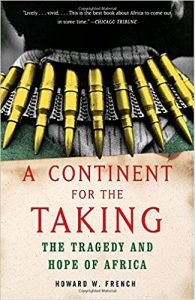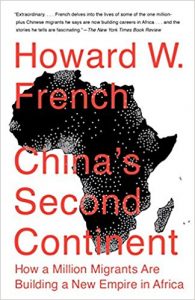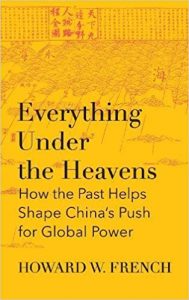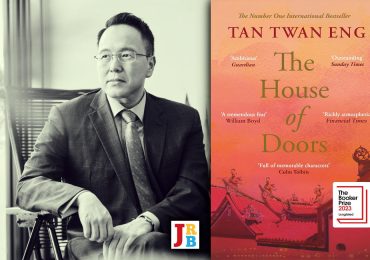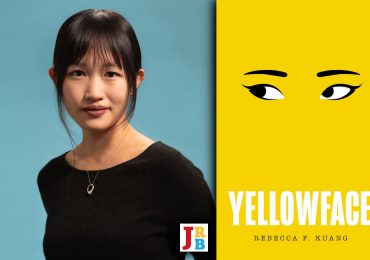In his three books on Africa–China relations, Howard W French’s thinking is robust—sometimes forcefully so—and yet fundamentally respectful.
A Continent for the Taking: The Tragedy and Hope of Africa (Vintage, 2005)
China’s Second Continent: How a Million Migrants Are Building a New Empire in Africa (Vintage, 2015)
Everything Under the Heavens: How the Past Helps Shape China’s Push for Global Power (Scribe UK, 2017)
1.
As a child growing up in Zambia, I imagined that no place on Earth was further away from where I stood than China. Chinese people seemed so unfamiliar, so very different from the other humans who populated my world. Most of the people who inhabited my life and my imagination were some or other shade of brown. They all had kinky hair and straight white teeth and used Vaseline and ate meat stew and maize meal for lunch and dinner.
There was some variation of course. There were whites and there were Indians. The white men we saw on the streets of Lusaka tended to be reddish in the face and burly and they often wore long socks pulled up to their knees and shorts that did little to cover their thick and hairy thighs. They spoke quickly and roughly and often seemed bad-tempered. The women were more elegant but also quite rare. You would see them now and then in sensible pumps going into or out of an office building. Neither the white men nor the white women looked anything at all like the beautiful white people on television, though, who always wore lipstick and had flowing hair and sharp but gentle features.
Then there were the Indians. They owned shops that sold everything from shampoo and toothpaste to fruit and vegetables. There were Indian children at school, though we did not really play together. On weekends my sisters and I would stare at the Indian couples who strolled around the Munda Wanga gardens holding hands and giggling. We heard the adults gossiping and saying it was because Indians lived on top of each other and had no privacy so this was the only way they could find time together.
There were no Chinese in the Africa of my childhood.
The absence of Chinese did not preclude me from knowing that a place called China existed. I knew China existed and was full of Chinese people because of my Uncle Stan, whom I called Daddy. There was a globe on Daddy’s desk. He let me spin it as often as I liked and was always thrilled when I knew the name of the capital city of whatever country my index finger landed on when it stopped whirling around. I was also a voracious reader and everyone was proud both of how well and widely read I was. I also wanted to be a palaeontologist. These three interconnected loves—of the world and its cities and countries and oceans and continents; of the earth and the bones that lay beneath it; and of the world of ideas—all found home in my favourite magazine, National Geographic. I would often sit in Uncle’s study and flip through old copies of the magazine. It was in the pages of those neatly stacked editions of the seminal catalogue of the world and its animals and peoples that I first encountered the Chinese.
They looked charming and odd and I longed one day to go to China. My desire to go to China was driven both by the innocent curiosity of a child, and by the need to verify whether indeed the people existed as they were documented in National Geographic. I was skeptical that there was such a real thing as a Chinese person. After all, I had never seen any of the ‘tribes’ National Geographic claimed existed. Indeed, I had never seen a single African half-naked with lip piercings and rubbed in mud. Urban child that I was, the word ‘tribe’ was only useful for understanding what language my classmates spoke at home: Bemba or Nyanja. I wondered whether Chinese people really did look anything like the behatted and simple folk who worked rice paddies and frowned up at me from the crisp pages of that magazine, which was delivered via the diplomatic bag that arrived from New York to Uncle’s office every month.
By the time I was a teenager, all thoughts and images of China had faded. At school my peers and I learned British history and geography. We learned about African Independence. There was mention of the great empires of Greece and Rome; sometimes a few lines as a footnote about China, but little beyond that.
When I went to university in the United States, I deepened my political and historical vocabulary. I read about the Middle Passage that brought Africans to the New World, about slavery and about dead US presidents. In the process, China simply ceased to exist—both insofar as my education was concerned and in my imagination.
America taught me to be interested in knowing more about the things I could already grasp. I learned to deepen my knowledge, rather than to broaden it. In America I learned to turn my head away from what I did not already know, in order to understand more about what I had already seen. In addition, I learned to face the Western world—Europe and America—in ways that are far more ingrained that I would like to admit. In short, my education involved the perfection of a particular brand of chauvinism.
As I grew into a critique of my Western education, I came to believe that wealthy, Western countries had a monopoly on thinking themselves superior to others. In his latest book, Howard W French challenges this idea. He delivers a sometimes blistering, often humorous and deeply thoughtful set of historical facts and analyses which demonstrate that the Chinese—in spite of half a century of centralised communist experimentation—have always seen themselves as significantly better than the cultures with whom they have historically made contact. This alone is interesting and important, for reasons that matter principally but not solely to China’s neighbours. For the African reader who is interested in writing both about the world and about how the world sees various parts of the African continent, French’s work—this book and his others—makes for essential reading. For he is a master of using old-school reportage to tell new kinds of stories in fundamentally subversive ways.
2.
Howard W French’s most recent book, Everything Under the Heavens: How the Past Helps to Shape China’s Push for Global Power, provides a discomfiting reminder of how much there is to know about the world. In the thirty years since I sat in that Lusaka study poring over National Geographic, China has emerged as a global economic giant. Still—I am ashamed to admit—I know little more about China now than I did back then. Challenging myself to name a handful of cities beyond Shanghai and Beijing, I struggle. I strain to remember even three former Chinese leaders.
It is strange, this dissonance between how important China is—to, among other things, Africa’s future—and how little even the most educated Africans generally know about Chinese politics, culture and society. It has been impossible for Africans to ignore the rise of China in the last fifteen years, and yet our knowledge and understanding of the country continues to be mediated either through Chinese government propaganda or through the lens of Western media outlets that carry their own biases and preconceptions about who the Chinese are and the sort of ‘threats’ they pose to the ‘rest of us’.
Fortunately, there’s French: It is difficult to think of a non-academic writer who has written as coherently or consistently on Africa and China—both as separate political geographies and as places whose political and economic fortunes have collided—than Howard W French.
French was a foreign correspondent in Africa and Asia during a particularly exciting set of decades for both continents. He worked for the New York Times as a bureau chief in various locations from 1990 to 2007, covering the Caribbean and Central America, West Africa, Japan and the Koreas and finally, Shanghai. Since leaving the Times in 2007, French has held a prestigious Open Society Fellowship, and has written the three books under review here. In journalistic terms, then, French is the equivalent of a four-star US general: he is Colin Powell unblemished by the stain of the Bush years.
It would be easy to view French as the ultimate insider, as simply the product of the institutions for which he has worked—a man who knows the ins and outs of the hallowed halls of the most prestigious organisations in the US. Yet as his books demonstrate, French is much more an outsider than he is an insider. His voice—measured, thoughtful, probing and often subtly humorous—is authoritative not because he understands how to operate within and report for elite institutions, but in spite of that fact. His books signal a refusal to kowtow to a received set of cultural norms that dictate how non-Western cultures will be discussed and reported on. There is a sense in which—no matter his subject material—French writes from the point of view of a writer who understands how it feels to have one’s society discounted and denigrated, and yet also understands deeply the lie of this denigration.
I am reminded of African American writer Zora Neale Hurston, who noted, ‘I have been amazed by the Anglo-Saxon’s lack of curiosity about the internal lives and emotions of the Negroes, and for that matter, any non-Anglo-Saxon peoples within our borders, above the class of unskilled labor’ (‘What White Publishers Won’t Print’, Negro Digest, April 1950).
French’s curiosity—no, the wide-ranging nature of his curiosity—speaks back to this idea that his white compatriots can often be deeply uninterested in anything but themselves and people like them. It is a symptom of American racism that has deep and far-reaching consequences for the world.
French may be a uniquely curious soul (as Hurston puts it, ‘Light came to me when I realized that I did not have to consider any racial group as a whole. God made them duck by duck and that was the only way I could see them.’) but still, having grown up black in America, it is likely that the way his curiosity manifests itself stands as a certain type of resistance, as a show of politics even when the subject matter is seemingly far removed as a target for American racism.
Nowhere is French’s insider-outsiderness on better display than in the opening lines of his first book, A Continent for the Taking: The Tragedy and Hope of Africa, as he describes meeting the woman who will become his first African girlfriend. Immediately, he is drawn into an ordinary and breathless conversation; the kind of gentle intellectual sparring that happens on nightclub rooftops and in bars and restaurants and living rooms across the African continent on a daily basis. Of meeting Mariam, French writes:
We spoke in French for a few minutes, and because of that, when she got around to asking me where I was from, she was a bit surprised to learn that I was American. I, on the other hand, assumed she was from Ivory Coast, and asked her what region of the country her family was from. The question elicited an immediate shock. ‘Me, from Ivory Coast?’ she said, indignantly. ‘I am not from here. I am from a grand country, Mali; a place with a real history!’
[…] Of course I had read plenty about Mali’s past greatness, about the fabled empires named Mali and Ghana, whose civilisations had flourished astride the ancient caravan routes across the Sahara between the sixth and fifteenth centuries. […]I had grown up in a strong African-American family, where pride and self-respect were passed on daily, and in abundance—together with lots of history. Bowing and scraping were alien to us, and we were reminded of the achievements of blacks at every turn, from people like Charles Drew, the doctor who pioneered blood transfusion and had been my father’s professor in medical school, to Ralph Bunche and Paul Robeson. Even so, it seemed that Mariam, whose pride in her culture was boundless, could easily teach us a thing or two when it came to holding our heads up. For Mariam, no matter how much I knew about Mali, it wasn’t enough. For her, her homeland was the centre of the universe, the cradle of African civilisation and the repository of its greatest culture.
French arrives in Africa already equipped with an understanding of what it means to be disregarded in the world, and, from the moment he sets foot on the continent, he knows to look out for others who hold their heads up. This does not mean he is starry-eyed and easily-fooled. On the contrary, he is astute and sharp—indeed, often eviscerating in his critiques. The stories French captures in A Continent for the Taking often involve poverty and war and despair; a large part of the book is an analysis of West and Central Africa’s many complex and tragic conflicts. Still, told through French’s eyes, these conflicts are portrayed as events; as rational if unfortunate (and often preventable) outcomes of terrifying and violent histories, rather than as indictments of an entire continent and its people.
In other words, beyond the subject matter, there is a powerful force at work in French’s writing. He may, for example, be making a case for better leadership in Africa, or outlining the shortfalls in China’s foreign policy, but French is almost always also exploring the contours of the cultural and psychological landscapes in which he finds himself. The politics and history matter greatly, but equally important to French is the intersection between how those who live in a place see themselves and how outsiders see them. In each new book, French circles back to that magical moment when Mariam declares that Mali—one of the world’s poorest—is ‘a grand country, a place with real history’. For French, every story begins with what societies believe to be wonderful about themselves and unfolds from there. He may or may not agree with them, but French’s analysis is generously predicated on taking each subject of each interview he conducts at her or his word and working backwards from there.
3.
French’s second book, China’s Second Continent: How a Million Migrants Are Building a New Empire in Africa, is an easy and enjoyable read for anyone who has travelled the African continent and seen the recent changes in infrastructure that have been brought about by China-Africa partnerships. At its core, however, the book grapples with a similar set of questions to those French lays out in his first: Who are these people and why do they behave in this way? What inspires them? Why do they believe they are special? French clearly has little time for cultural chauvinists—and there are more than a few he encounters during his travels—and avoids indulging the spectacle of chauvinism, which allows him to tell the story of Chinese entrepreneurs in Africa, and outline their struggles, in new conceptual terrain. He lists the racist views many of his subjects hold, but he does so without rancour or condescension. This does not mean French is neutral: He is however, unfazed and unsurprised and therefore unwilling to stop his line of inquiry or to get diverted and distracted by the racism.
Take for example this encounter in Senegal:
The next morning, Li overheard me complaining loudly on the telephone to Kenya Airways about my lost bags.
‘Black people are not good at getting things done,’ he said, when I had hung up. ‘Their customs were formed back when there was no telephone and no highway. It’s very easy for them to put anything that’s not immediate out of mind.’
Li had given in to the age-old expat’s game of armchair diagnostician of whatever ails Africa. To change the subject, I asked him what he thought of the country’s rival communities of Lebanese and Indians. Were they as hardworking as the Chinese? Would they lose their grip to the newcomers?
Li said that Chinese merchants had certain advantages in sourcing the manufactured goods they sold in China. ‘We don’t need to buy a ticket to go to China to do business. We have our people there. We know the scene best. We will get the best prices.’
Then he said something that surprised me, and took some of the edge off his earlier race talk. ‘I don’t believe in the idea that some nationalities automatically work harder than others. It’s all about making money work for you, and everyone is different. What I can say is that if you pay them well, even blacks can eat bitter just as much as any Chinese. If you don’t give a Chinese enough food to eat and you give him no incentive, there’s no way he’ll work hard. That’s what makes any country develop.’
Because I have grown so accustomed to a certain strain of Chinese discourse that emphasises how distinct from others they are, and usually by clear inference this means how superior they feel, this struck me as a rare response.
‘I reject this,’ Li said, commenting about Chinese notions of superiority. ‘I know that lots of Chinese people feel this way, but that’s because they haven’t experienced anything. Being outside of the country, coming in contact with different people all the time has allowed me to understand.’
As in A Continent for the Taking, French serves here as a thoughtful guide to those who want to move beyond the usual descriptions of Chinese as ‘racist’ or ‘money-grubbing’. While the book notes the many tensions between Africans and Chinese, it is not fundamentally a book about this friction. It is a book about the kind of mentality required to leave China headed for a continent about which you know nothing; and it is a book about the traps of superior thinking. If French himself is a model for how to both live within a society and observe it from the outside, then the Chinese migrants he interviews are, in the main—Li, above, aside—examples of what you lose if you are unable to respect a place and its people.
There is a hollowness in the lives of so many of the Chinese French interviews. He is dogged in his documentation of these lives—the opinions, the successes, the failures. As a consequence, China’s Second Continent is full of weary patience for people who are, on the surface at least, largely intolerable. French plays the long game, sticking with an interview subject through boredom and rudeness, across landscapes and into city shanty towns. He is with them from morning until deep into the night.
There is something here about craft–about the job of a reporter when she or he is actually reporting well. French does this—one senses—in order to make the point that it is only by spending the time, by putting in the hours, by being there, that one can understand the shape and patterns of another mind. French stays with people long enough to allow them to do more than they might otherwise do. He allows his subjects to move beyond simply confirming what is expected of them. He is prepared to wait for that ‘rare response’ that illuminates his subject, and gives him his story.
In the end, of course, many of the Chinese people French interviews in China’s Second Continent have appalling views of Africans, their work ethic, their government leaders and so on. Time and again the book reveals one stereotype after another about Africans, and by its closing chapter, French concludes that most of the Chinese he has encountered see Africans as ‘children, capable of only baby steps to be brought along with sugary inducements and infantilising speech’. This is important, not because it confirms what Africans suspect about the Chinese, but because it speaks to a larger question around Chinese identity. In the closing chapters of Second Continent, French argues that Chinese relationships with Africans mimic the imperial nature of those China has traditionally had with its neighbours. In other words, many of the Chinese who interact so horribly with Africans are doing so because they are steeped in a culture of superiority. The abilities or inabilities of Africans are completely beside the point. By the final chapter, Second Continent has homed in on the topic that serves as the basis for French’s most recent book.
4.
In Everything Under the Heavens: How the Past Helps Shape China’s Push for Global Power, French critiques the notion of Chinese superiority as a basis for foreign policy, while demonstrating that, though it is a flawed approach, it is entirely grounded with the nation’s impressive record of achievements through history. China is a large, complex and enormously accomplished culture that views itself, non-ironically, as the Centre of the Universe. This may not have always worked in its favour—and will not work in the present moment, as French shows—but it is hardly unexpected that an ancient giant would see itself this way. In his book, French manages to acknowledge China for its former glory while admonishing it for the blindspots that are inevitably contained within its superiority complex.
Like French’s first two books, Everything Under the Heavens places at its centre people, places and cultures that have been considered marginal by Europeans and Americans. He expects the reader to accept the culture he is examining as the entry point for all discussions upfront; this a profound and destabilising tactic.
French explores China’s sense of superiority from within its own paradigm. Rather than explode the idea that China is culturally superior, he demonstrates both its richness, and the fragility that believing in the notion of cultural superiority delivers in the first place. And he does this with a deftness that is remarkable. The book—like his others—contains a meta-commentary on the notion of exceptionalism, one that is shared widely across cultures. It turns out that the key to understanding this, as an outsider, is first to recognise and respect it. For out of respect, French seems to say, comes curiosity, and out of curiosity comes the sort of deep understanding that makes way to robust critique and engagement.
Like all books that are ambitious in scope, Everything Under the Heavens is more than a handy reference for those wishing to understand the events of a particular time and place. While this new offering includes important commentary on what is happening in, say, the South China Sea, or with the simmering conflict between the US and the Philippines, it also provides a subtle and critical look at the cultural underpinnings of a civilisation pushing out into the world—with consequences for everyone in it.
‘Everything Under the Heavens’ doesn’t just make for an evocative book title; it’s the translation of a concept, tian xia—the notion that Chinese rule really does govern everything under heaven. As French writes:
For the better part of two millennia, the norm for China, from its own perspective, was a natural dominion over everything under heaven, a concept known in the Chinese language as tian xia. It is not a term to be taken too literally. From very early times, China had an awareness of faraway places, including other great empires, like Rome, but contact with such distant regions of the world was tenuous at best […] In the geopolitics of Chinese empire, what was most vital to the Central Kingdom under tian xia, sometimes interpreted as the ‘known world’ in this context, was a vast and familiar swath of geography that consisted of nearby Central Asia, Southeast Asia and East Asia.
As French explains, tian xia is a foundational myth of Chinese superiority, the story Chinese have told themselves, their neighbours and those they have conquered across centuries. For most of China’s history, French notes, tian xia expressed itself most succinctly through the tributary system, in which Chinese emperors allowed their neighbours to govern themselves so long as they were paid the requisite respect. The tributary system grew out of and then fed into a larger belief system in which Chinese virtue and culture were seen (by the Chinese) as ‘irresistible forces that have attracted other countries into China’s orbit’.
French suggests China’s place in the world today, and the increasingly robust manner in which it is engaged in the coastal areas surrounding it, must be understood through a historical lens. While there are clearly economic motivations for China’s desire to control the seas, invest in ports and airports and mining in Africa, and buy ever-larger amounts of coal and titanium, there is also a cultural and historical drive. China’s actions today are not the consequence of new imperatives. Instead, French argues, with the recent revival of nationalism, and a sense that China must play a wider and more important role in the world, Beijing is (self-) fulfilling a historical mandate.
French notes:
As China has revived Zheng’s memory, among the most persistent claims it has made is that his life and career are proof of its most fundamental distinction from the supposedly inherently aggressive West, that is, that it has never imposed itself on others as a colonial or imperial power.
As Everything Under the Heavens points out, of course, this idea of China as the antithesis of colonialism is quite simply false. French puts it succinctly, arguing, ‘To the contrary, nearly the entire perimeter of present-day China was incorporated via tactics of imperial conquest and subsequent colonialism.’
In the last fifteen years Africans have frequently encountered this idea of Chinese ‘innocence’, as our leaders have sold us on Chinese investment. Many an African president has noted that the Chinese may be interested in Africa’s resources but they come bearing no imperial or colonial baggage. While it may be the case that China has no colonial history in Africa, French’s book points out that its history is not innocent. China knows how to colonise.
Still, for many Africans China is increasingly coming to represent a different kind of global power—one that has until the recent past been poor itself, and that has tasted the bitter fruit of humiliation. Unlike ‘the West’—that bogeyman that has left complicated and painful memories on the African continent—many Africans have come to believe the Chinese state is largely benign. It is worth noting that no one denies China’s economic intentions. But because of Europe’s history in Africa, China is seen as the better devil. It is seen as having a strong set of economic interests, but is praised for the fact that these are decoupled from colonial attitudes.
For the increasing number of African students and intellectuals who now study China, visit the country and live in its cities, and track its activities on this continent, Everything Under the Heavens will be an important book. It provides a cultural and political history of one of the world’s most dynamic and important regions—a region increasingly making itself part of Africa’s story in the twenty-first century.
Those engaged in the broader work of making and examining ideas around what it means to be human, and what it has meant during the last few centuries, will want to read all of French’s books. At the heart of each is an exploration of how to understand societies and civilisations—and people—on their own terms. Whether he is writing about Africa or China, French is writing from a position of genuine curiosity that is borne out of a respect for the many ways in which people are interesting. He is not sentimental. He never goes easy on his subjects. He neither pities nor condescends to the societies he has within his sights. Instead, he engages them on their own terms, from within an understanding of how they see the world. He aims always to critique and to illuminate. French manages to be robust—sometimes forcefully so—and yet fundamentally respectful.
Beginning with A Continent for the Taking, moving into China’s Second Continent and now with Everything Under the Heavens, French maps the short road between the Africa of my childhood and the China of my imagination. It is a credit to his skill as a writer and storyteller that he manages to render both as real and exceptional and important places in their own right. French may be an important China-Africa expert, but his growing body of work offers much more than meets the eye. His books serve as a primers on how to write about the social DNA that underpins all human endeavour.
- Sisonke Msimang is a writer and activist who works on race, gender, democracy and politics. Her memoir, Always Another Country, will be published by Jonathan Ball Publishers in October 2017.

